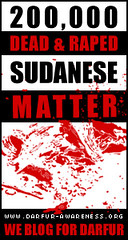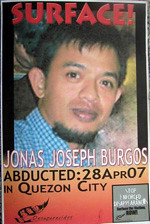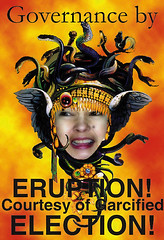A New Political Party Emerges with a New Leader
In a historic move Tuesday, March 24, unprecedented in post-Marcos politics, a new political party - the Democratic Party of the Philippines (DPP) – emerges with the submission of its Constitution and By-Laws to the COMELEC. With it comes a new leader, Ernesto G. Ramos, a native of Binalonan, Pangasinan and UST alumnus.
The DPP’s Preamble requires party-members to commit themselves ”.. to establish a morally upright just humane, democratic and peaceful Philippine society based on the unrelenting respect for life, liberty, property and human dignity that shall build and sustain a GOD-centered, people-empowered, prosperous and harmonious national community; and who swear to undertake this task with honesty, integrity, courage, generosity and charity.
It also seeks to: 1) decentralize political power through devolution, de-concentration and local autonomy for cultural communities; 2) ensure that politics promotes the national interests, thus transforming the politics of patronage and personalities into one of service as an ideology; and 3) help establish a responsible, accountable and transparent system of government.
“I know we’ve finally found the right person for the right task,” remarked Atty. Oswald Lorenzo, the DPP’s secretary-general, a law professor and reviewer. “He’ll bring a fresh and courageous vision for a nation and its form of government in need of radical change from the bottoms-up. We’re assured our agenda and platform of government he expounded in our Blueprint for Stewardship are geared towards a new kind of leadership.”
The new leader left the Philippines in 1970 armed with a scholarship for post-graduate studies at Loyola University of Chicago, and served as professor with the Chicago Consortium of Colleges and Universities. He was soon awarded the prestigious National Fellowship with the Rockefeller Foundation’s Institute of Social Sciences, the first and only Filipino thus far to be so honored, under the auspices of the Rev. Fr. Ted Hesburgh, the Foundation’s Board Chairman and former President of the University of Notre Dame. After that stint, he worked as consultant with the U.S. Dept of Education and the U.S. office of Civil Rights in Washington, D.C.
His more that 24-year apprenticeship as legislative adviser and speechwriter to then-Senator Carrie P. Meek, Senate President Pro-Tempore of the Florida State Legislature since 1984—and subsequently following her to the U.S. Congress in 1992—has amply prepared him for the intricacies of government service. His role as Chief Deputy to U.S. Rep. Kendrick Meek, upon the retirement of the latter's mother in 2002, further honed his expertise in the more intricate challenges of converging the role of the legislative with the executive branch of government. He’s currently helping Mr. Meek become Florida’s U.S. Senator during the 2010 elections.
“My walking the corridors of power in the Congress through all those years—complemented by my visits to the White House under the successful 8-year Clinton presidency to fellow up on pending legislations and resolutions on behalf of the people of the Florida and America—gives me the jumpstart in tackling the awesome task of service-governance on behalf of the Filipino people ,” Mr. Ramos exudes. “ I’m prepared to face the odds, and I have no illusion that this is an easy task; however I’m confident that team I’m putting together is up to the challenge of building a new nation spearheaded by ethically upright, honest and courageous servant-leaders.”
He also crafted the enabling language for 3 major laws that are now in the U.S. Congressional Records—the 1997 Nicaraguan & Central American Refugee Act (NACARA), the 1998 Haitian Refugee Fairness Act (HRIFA) and the 2000 Violence Against Women’s Act (VAWA) - on behalf of refugees and women abused by their husbands.
A known maverick of a leader. Mr. Ramos chaired the National Federation of FilAm Association of America (NaFFAA) for the Southern Region comprising the states of Alabama, Florida, Georgia, Mississippi, North Carolina and South Carolina and Tennessee. He currently chairs Florida’s FilAm Political Alliance, Inc., the only registered political action committee (PAC) that funds and endorses candidates for elected offices. His was the lead group that created the coalition between Florida’s Asian-American Pacific Islanders (AAPI) and the Democratic National Committee (DNC), paving the way for Barack Obama’s historic march into the White House by winning Florida, a key battleground state last year’s elections.
A firm believer in the process of converging “conscientization” by which one must always do what’s right and what’s just for the common good, he has ensured that DPP ”..upholds the value of human life and guarantees full respect for the exercise of the Filipino’s civil, economic, and political rights under a just and dynamic social order.” Central to his belief is the party’s stance to stress the universal ideals of democracy and appreciate the historical contributions of our national identity of Christianity and Islam, along with the country’s indigenous religions and tribal practices.
Such is the mettle of this DPP leader. Known simply as “Manong Ernie” to his supporters from PAX, a nationwide alliance of seminary alumni and priests, and from former FVR Support Groups and other coalitions, he manifests easy confidence in expounding the complexity of crafting the enabling language of legislation. A Dual citizen, he has already filed his voter’s registration with his hometown’s COMELEC office, as he gears himself up for the rough and tumble of Filipino-style campaign politics.
“The vision and brand of leadership that Manong Ernie gives us is timely and crucial for our country, “confides Arsen Menor, a PAX leader. “We’re confident his background and expertise will more that qualify him for the challenge ahead.”
An indefatigable bridge-builder, he has tirelessly encouraged his Philippines-based support groups by sharing with them his connecting-the-dot strategy among the Filipino groups in America and various OFW groups in the global Filipino Diaspora . He firmly contends that as a key component of our nation’s stakeholders, Filipinos from abroad must be given the basic assistance to enable them to fully participate in the forthcoming Elections.
A proud son of a WW II veteran/POW, he took up the cudgels in 2006 to lead NaFFAA’s FilVets Committee and spearheaded the passage of the WW II Filipino Veterans Act in the U.S. Congress. The bill had languished there for 62 years since the passage of the anomalous 1946 Rescission Act that obliterated Filipino veterans’ benefits. Bound by his conviction that America must right this wrong against our veterans, he led an intrepid band of FilAm leaders by literally badgering members of Congress with e-mails, phone calls and visits. Thanks to Hawaii U.S. Senators Dan Inouye and Daniel Akaka and California U.S. Rep. Bob Filner and the National Federation for Veterans Equity (NAFVE), the bill was signed into law by President Barack Obama last January 29, 2009.
Having learned from the best statesmen and productive leaders during his time in the U.S. Congress, he’s ready to right the wrongs plaguing Philippine politics, its governance and its delivery mechanisms towards serving the people, shying away from the penchant for wasting precious time and discarding magnificent opportunities for advancing the nation’s common good.
The quest for full and aggressive partnership with those called upon to serve the people’s needs is validated by do-able goals and objectives – along with expected outcomes – in his Blueprint for Stewardship, charting a common-sense approach towards nation-building defined by moral courage and the political will to radically change the direction of government.
“The core values our Movement espouses and the principles upon which our Democratic Party is founded symbolize the heart and character of the Filipino people… the core values of honesty and simple justice, responsibility and caring for the less fortunate among us, “says Donato Flordeliza, the lead convenor of the Save Our Nation Movement. “We intend to speak with one clear voice, and shape a comprehensive national agenda – and move our nation in a caring, compassionate, and responsible direction on behalf of our people, long shortchanged by the duplicity and dislocated by the arrogance of power of current politicians and bureaucrats.”
Prior to his returning to Manila to address the PAX Convention to be held at Christ The King Seminary in Quezon City on April 24-26, 2009, the DPP leader is spearheading a summit meeting in Tampa, Florida on April 3-5 with Filipino-Americans and OFW leaders from some 32 states alongside America’s eastern seaboard to map out strategies for enabling Dual citizens and other Filipinos to fully participate in the May 2010 Elections.
The DPP’s Preamble requires party-members to commit themselves ”.. to establish a morally upright just humane, democratic and peaceful Philippine society based on the unrelenting respect for life, liberty, property and human dignity that shall build and sustain a GOD-centered, people-empowered, prosperous and harmonious national community; and who swear to undertake this task with honesty, integrity, courage, generosity and charity.
It also seeks to: 1) decentralize political power through devolution, de-concentration and local autonomy for cultural communities; 2) ensure that politics promotes the national interests, thus transforming the politics of patronage and personalities into one of service as an ideology; and 3) help establish a responsible, accountable and transparent system of government.
“I know we’ve finally found the right person for the right task,” remarked Atty. Oswald Lorenzo, the DPP’s secretary-general, a law professor and reviewer. “He’ll bring a fresh and courageous vision for a nation and its form of government in need of radical change from the bottoms-up. We’re assured our agenda and platform of government he expounded in our Blueprint for Stewardship are geared towards a new kind of leadership.”
The new leader left the Philippines in 1970 armed with a scholarship for post-graduate studies at Loyola University of Chicago, and served as professor with the Chicago Consortium of Colleges and Universities. He was soon awarded the prestigious National Fellowship with the Rockefeller Foundation’s Institute of Social Sciences, the first and only Filipino thus far to be so honored, under the auspices of the Rev. Fr. Ted Hesburgh, the Foundation’s Board Chairman and former President of the University of Notre Dame. After that stint, he worked as consultant with the U.S. Dept of Education and the U.S. office of Civil Rights in Washington, D.C.
His more that 24-year apprenticeship as legislative adviser and speechwriter to then-Senator Carrie P. Meek, Senate President Pro-Tempore of the Florida State Legislature since 1984—and subsequently following her to the U.S. Congress in 1992—has amply prepared him for the intricacies of government service. His role as Chief Deputy to U.S. Rep. Kendrick Meek, upon the retirement of the latter's mother in 2002, further honed his expertise in the more intricate challenges of converging the role of the legislative with the executive branch of government. He’s currently helping Mr. Meek become Florida’s U.S. Senator during the 2010 elections.
“My walking the corridors of power in the Congress through all those years—complemented by my visits to the White House under the successful 8-year Clinton presidency to fellow up on pending legislations and resolutions on behalf of the people of the Florida and America—gives me the jumpstart in tackling the awesome task of service-governance on behalf of the Filipino people ,” Mr. Ramos exudes. “ I’m prepared to face the odds, and I have no illusion that this is an easy task; however I’m confident that team I’m putting together is up to the challenge of building a new nation spearheaded by ethically upright, honest and courageous servant-leaders.”
He also crafted the enabling language for 3 major laws that are now in the U.S. Congressional Records—the 1997 Nicaraguan & Central American Refugee Act (NACARA), the 1998 Haitian Refugee Fairness Act (HRIFA) and the 2000 Violence Against Women’s Act (VAWA) - on behalf of refugees and women abused by their husbands.
A known maverick of a leader. Mr. Ramos chaired the National Federation of FilAm Association of America (NaFFAA) for the Southern Region comprising the states of Alabama, Florida, Georgia, Mississippi, North Carolina and South Carolina and Tennessee. He currently chairs Florida’s FilAm Political Alliance, Inc., the only registered political action committee (PAC) that funds and endorses candidates for elected offices. His was the lead group that created the coalition between Florida’s Asian-American Pacific Islanders (AAPI) and the Democratic National Committee (DNC), paving the way for Barack Obama’s historic march into the White House by winning Florida, a key battleground state last year’s elections.
A firm believer in the process of converging “conscientization” by which one must always do what’s right and what’s just for the common good, he has ensured that DPP ”..upholds the value of human life and guarantees full respect for the exercise of the Filipino’s civil, economic, and political rights under a just and dynamic social order.” Central to his belief is the party’s stance to stress the universal ideals of democracy and appreciate the historical contributions of our national identity of Christianity and Islam, along with the country’s indigenous religions and tribal practices.
Such is the mettle of this DPP leader. Known simply as “Manong Ernie” to his supporters from PAX, a nationwide alliance of seminary alumni and priests, and from former FVR Support Groups and other coalitions, he manifests easy confidence in expounding the complexity of crafting the enabling language of legislation. A Dual citizen, he has already filed his voter’s registration with his hometown’s COMELEC office, as he gears himself up for the rough and tumble of Filipino-style campaign politics.
“The vision and brand of leadership that Manong Ernie gives us is timely and crucial for our country, “confides Arsen Menor, a PAX leader. “We’re confident his background and expertise will more that qualify him for the challenge ahead.”
An indefatigable bridge-builder, he has tirelessly encouraged his Philippines-based support groups by sharing with them his connecting-the-dot strategy among the Filipino groups in America and various OFW groups in the global Filipino Diaspora . He firmly contends that as a key component of our nation’s stakeholders, Filipinos from abroad must be given the basic assistance to enable them to fully participate in the forthcoming Elections.
A proud son of a WW II veteran/POW, he took up the cudgels in 2006 to lead NaFFAA’s FilVets Committee and spearheaded the passage of the WW II Filipino Veterans Act in the U.S. Congress. The bill had languished there for 62 years since the passage of the anomalous 1946 Rescission Act that obliterated Filipino veterans’ benefits. Bound by his conviction that America must right this wrong against our veterans, he led an intrepid band of FilAm leaders by literally badgering members of Congress with e-mails, phone calls and visits. Thanks to Hawaii U.S. Senators Dan Inouye and Daniel Akaka and California U.S. Rep. Bob Filner and the National Federation for Veterans Equity (NAFVE), the bill was signed into law by President Barack Obama last January 29, 2009.
Having learned from the best statesmen and productive leaders during his time in the U.S. Congress, he’s ready to right the wrongs plaguing Philippine politics, its governance and its delivery mechanisms towards serving the people, shying away from the penchant for wasting precious time and discarding magnificent opportunities for advancing the nation’s common good.
The quest for full and aggressive partnership with those called upon to serve the people’s needs is validated by do-able goals and objectives – along with expected outcomes – in his Blueprint for Stewardship, charting a common-sense approach towards nation-building defined by moral courage and the political will to radically change the direction of government.
“The core values our Movement espouses and the principles upon which our Democratic Party is founded symbolize the heart and character of the Filipino people… the core values of honesty and simple justice, responsibility and caring for the less fortunate among us, “says Donato Flordeliza, the lead convenor of the Save Our Nation Movement. “We intend to speak with one clear voice, and shape a comprehensive national agenda – and move our nation in a caring, compassionate, and responsible direction on behalf of our people, long shortchanged by the duplicity and dislocated by the arrogance of power of current politicians and bureaucrats.”
Prior to his returning to Manila to address the PAX Convention to be held at Christ The King Seminary in Quezon City on April 24-26, 2009, the DPP leader is spearheading a summit meeting in Tampa, Florida on April 3-5 with Filipino-Americans and OFW leaders from some 32 states alongside America’s eastern seaboard to map out strategies for enabling Dual citizens and other Filipinos to fully participate in the May 2010 Elections.

POGB will not sell, exchange, use or allow any 3rd party access to your email for
any other purposes without exception, email exclusively for article updates only.
























1 Speak Out:
Political scientist Nathan Quimpo provides perhaps the best description of contemporary Philippine political parties: "convenient vehicles of patronage that can be set up, merged with others, split, reconstituted, regurgitated, resurrected, renamed, repackaged, recycled, refurbished, buffed up or flushed down the toilet anytime."
Post a Comment